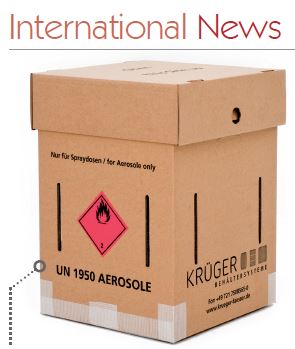Written on: July 1, 2012 by SprayTM

A new 70-liter corrugated board box from SCA Packaging Germany makes the transport and disposal of empty aerosol cans from collection point to incinerator safer, with the risk of explosion reduced. Supplied by Krüger Behältersysteme, the box has slots help ensure sufficient ventilation and a PET coating on the inside to help prevent leaking fluids from soaking and softening the box. This is supported by an absorbent floor mat that can absorb up to 0.8 liters of fluid. The box is easy to handle, requires no additional inner bags and can be quickly erected in a few simple steps. The specially designed lid can be repeatedly closed and opened while extra-strength adhesive tape made of polypropylene and glass fiber improves stability and further optimizes the tightness of the pack. Tabs on the side panels serve as safety locks. The packaging and aerosol cans are burned together in an incinerator.
The haz-mat pack was successfully tested in SCA Packaging’s testing center, recognized by the Federal Institute for Materials Research & Testing (BAM). It meets the General Packaging Requirements for hazardous materials, specifically for aerosols; the requirements of the Special Provision 327 for waste compressed gas packaging; and passed the drop test specified in Packing Group III.
The 7th edition of Aerosol Dispensing & Forum (ADF) will meet on Feb. 8-9, 2013 at space Champerret, Paris, France to bring together global experts in aerosol dispensing technologies. The international meeting, which gathers brand representatives, their main suppliers and academic experts, will be held simultaneously with the 9th edition of Packaging of Perfumes, Cosmetics & Design (PCD). Combined, both events attracted over 2,432 participants from 43 countries in 2012. www.aerosol-forum.com
The Lindal Group announced plans to more than double the size of its Sao Paulo, Brazilbased facility, moving from the Jundiai area to the nearby town of Itupeva, in response to continued growth in the regional consumer product market. The company has leased a new, custom-built, expandable construction that will add manufacturing capacity for aerosol valves and house all molding and assembly operations, as well as provide office space for all staff, including sales, customer service, lab and manufacturing support teams.
“When we relocate to our new Itupeva facility by 3Q12, we will have expanded our Brazilian facility by 250%, to 3,000 square meters,” said Lindal Brazil’s Managing Director, Moacir Camargo. “The growth of the Brazilian beauty market alone—7.3% in 2011—will boost demand for aerosol solutions.”
The Association of European Producers of Steel for Packaging (APEAL) announced that 71% of steel packaging in Europe was recycled in 2010. Steel is still the most recycled packaging material in Europe, according to APEAL. The steel packaging industry is committed to increasing recycling rates even further, focusing on a long term objective of achieving an 80% recycling rate and zero metal cans in landfill in Europe by 2020, a higher goal than current EU or national targets. Germany for example, which achieved a rate of 93.8% in 2011, has not dropped below a 90% recycling rate since 1997—exceeding the post-consumer packaging scrap national target of 70%.
Additionally, the steel for packaging industry in Europe has lowered its global warming potential (mainly CO2 emissions) by 9% over two years. The environmental footprint of tinplate production has also been reduced in other impact categories, such as acidification (-6%), eutrophication (-11%) and primary energy demand (-3%). In Europe, where 71% of tinplate is recycled, CO2 emissions are currently reduced by 42%, according